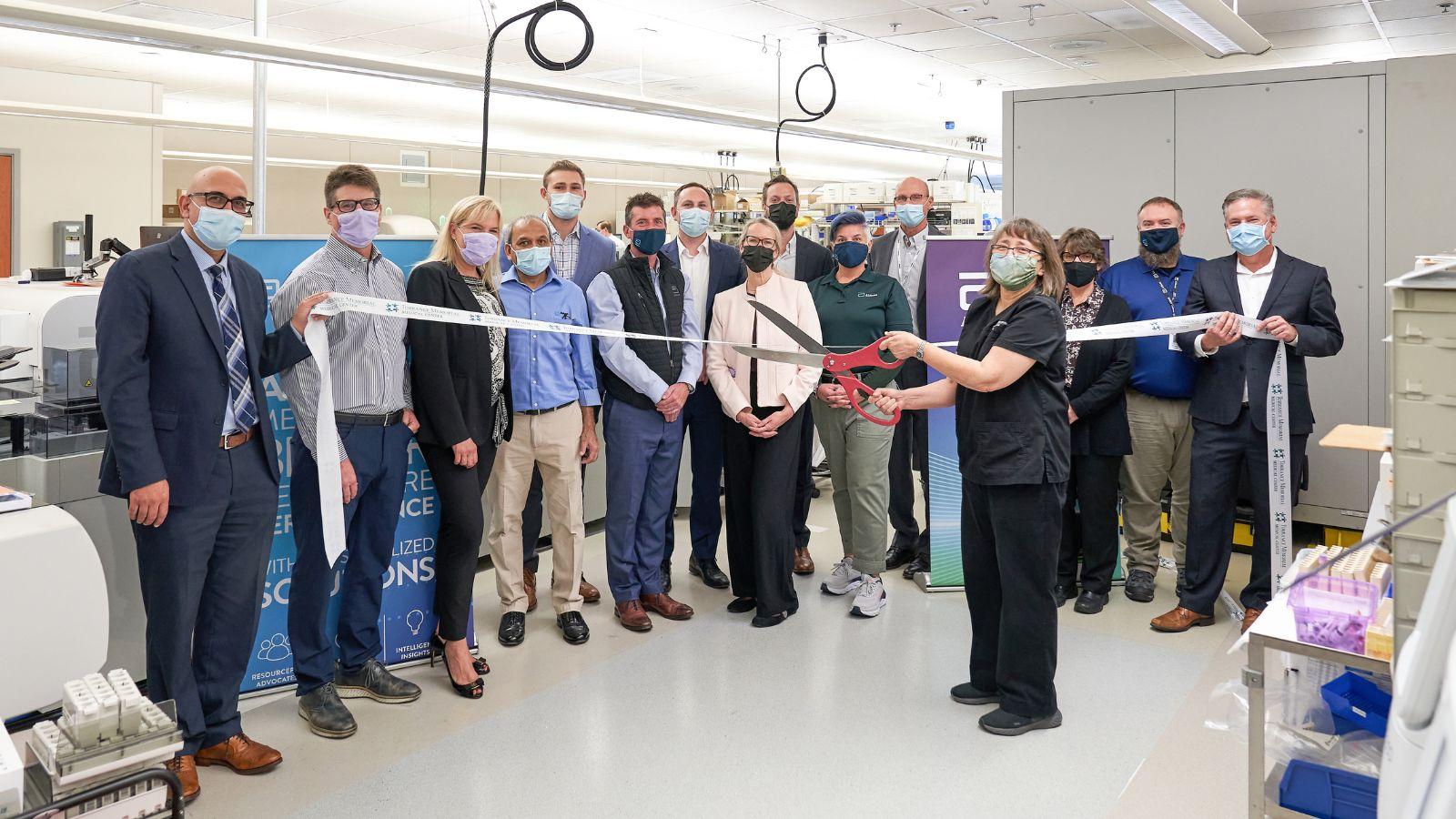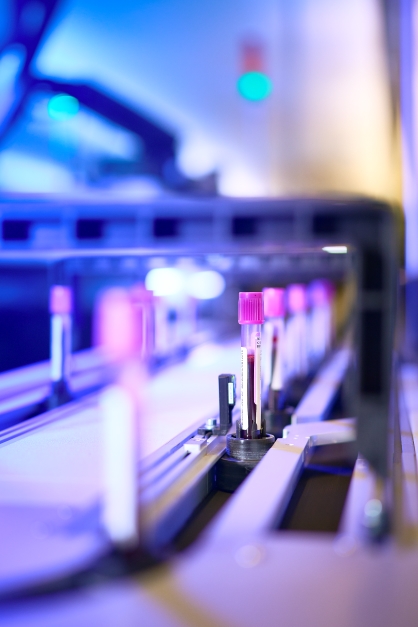
Torrance Memorial invests in high-quality improvements to this testing center.
Written by Nancy Sokoler Steiner | Photographed by Vincent Rios
A few drops of blood. An ounce or two of urine. These simple substances can reveal what’s going on inside the body, giving physicians information crucial to successfully treating their patients. In fact, 70% of clinical decisions rely on lab tests, says Ihab Abumuhor, director of Torrance Memorial Medical Center’s pathology and clinical laboratory.
Operating 24 hours a day, seven days a week, the lab performs more than 4½ million tests annually. Thanks to Torrance Memorial’s investment in renovations and new technologies, lab services are of higher quality and greater efficiency than ever before.
“Our goal is to provide high-quality, accurate, timely and innovative clinical laboratory services,” says Abumuhor. “We aim to turn around 95% of blood chemistry tests, CBCs and coagulation tests within 45 minutes.”
Blood chemistry tests are used to evaluate and screen for many conditions including electrolyte balance, kidney function and liver function. CBC, or complete blood count, measures the types and numbers of cells in the blood. Coagulation tests, such as prothrombin time, measure how long it takes blood to clot.
New Testing System
The ambitious 45-minute goal became possible thanks to several major updates. The first involved a lab reconstruction to remove the previous testing platform and install a new Alinity system. The new platform allows for faster, more accurate results while increasing capacity and lowering costs.

It has a fully automated track, meaning once a sample is placed on the track, the system performs all the steps required without a technician needing to move or prepare samples. These steps include:
- Reading the barcode on the samples
- Determining the type of tests needed and routing samples to the appropriate instrument(s)
- Centrifuging the tube and uncapping it
- Portioning the samples
- Separating samples that need to be sent out from those done in-house
- Analyzing the sample’s chemistry
- (37 types of tests available, including blood glucose, electrolytes, hormones, lipids and proteins)
- Interfacing with the electronic medical record (EMR)
- Recapping the sample
- Delivering the completed sample to refrigerated storage
Torrance Memorial is the first Alinity hospital-based core lab to go live in California. When it was time to update and replace the chemistry line, offerings from multiple manufacturers were reviewed in detail. The decision to go with Alinity was primarily due to quality, measured as the Sigma metric for each test, which is a combination of both accuracy and precision (reproducibility). Head-to-head comparison showed Alinity to be superior overall.
“We knew the change to Alinity would be a difficult transition and we would have to suffer through the pain of change for a few months with new construction and completely new instrumentation. But long-term it was clearly the right move,” says pathologist John Kunesh, MD.
He notes accuracy and efficiency have many positive impacts, including getting the most accurate and reproducible results possible to physicians faster, thus allowing for patient discharges to happen in a timely manner. It also provides speedy results, which appear on the patient portal.
In addition, notes Abumuhor, the new Alinity system frees up lab personnel to engage in other vital activities including working on quality control metrics, validating testing, training employees, troubleshooting issues with instruments and manually performing tests that are not automated.
In December the lab brought in-house 15 tests previously requiring off-site analysis. That brings the number of tests performed at Torrance Memorial to more than 130. The array of services and programs provided by the lab include molecular microbiology testing (e.g., bacteria and viruses), pathology, phlebotomy, point-of-care testing and the Blood Bank and Blood Donor Center. It maintains three blood draw stations on the medical center campus as well as four community locations.
Performance and Inventory Monitoring
The lab also acquired AlinIQ Business performance capability, which enables monitoring of volumes, capacity, costs, turnaround times and other important metrics. Among other things, analysis showed the lab performs an average of 6.35 tests per sample.
Another new system, the ABBOTT Inventory Manager, performs automated inventory management. Items get scanned upon delivery and tracked during usage. The system alerts lab personnel when to order new stock and when items are approaching expiration. Previously, staff manually logged each item on a spreadsheet.
Official Debut
Torrance Memorial staff involved in the many aspects of making the lab enhancements possible attended a ceremonial ribbon-cutting on November 16. Core laboratory manager Patty Drew cut the ribbon, accompanied by Dr. Kunesh. The ribbon was held by Abumuhor and executive vice president Keith Hobbs.
“This was a collaborative effort that involved the support of administration, finance, IT and purchasing. IT alone involved server, desktop, remote access and security capabilities,” says Abumuhor. “Everybody was behind this effort because they knew it was vital for the lab’s future and because they understand how important it is to provide high-quality, accurate and timely results.”
He adds, “Labs tend to operate behind the scenes. COVID-19 put the spotlight on the role of labs when testing became so crucial. People now have a better understanding of how essential the lab is.”
Looking Ahead
- Abumuhor notes more improvements are planned for the lab in the future. They include testing for:
- Immunology
- Allergy
- Infectious disease
- Autoimmune disease
- Serum proteins
- Calprotectin (an indicator of bacterial or parasitic infections, colorectal cancer or certain diseases that cause intestinal inflammation)
- Fungitell (fungal infections)
“The pathology and clinical laboratory at Torrance Memorial aims to continue being the leading clinical laboratory in the area,” says Abumuhor. “The new enhancements serve our goal of providing innovative, timely, accurate and high-quality testing. We see this as an ongoing process where we continuously aim for even greater excellence and improvement.” •






